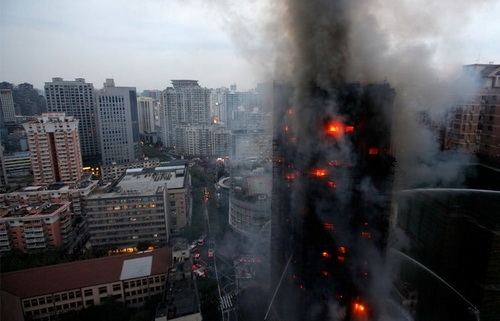
Weibo and Society Share the Same Ethical Limits
Nation, page 15
Issue No. 531, Aug 8, 2011
By Zhang Bangsong (张邦松), an editor with the EO's Business Review section
Original article: [Chinese]
http://www.eeo.com.cn/2011/0807/208199.shtml
A report on CCTV's early morning news program recently asked "Where is Weibo's ethical 'bottom line'?" (微博的伦理底线在哪里?) The question they should have asked instead is "what's the ethical 'bottom line' of those Weibo users who spread rumors? Clearly, the behavior of particular individuals in a group isn't representative of the whole group, especially in a loose online platform like Weibo. After all, We didn't ask CCTV what their ethical 'bottom line' was after one of their employees was sentenced to 10 years in prison on corruption charges in 2003.
http://news.163.com/08/0903/01/4KSMVKVG00011229.html
This is a very important distinction–which ethical 'bottom line' should we be concerned about? The ethical bottom line of Weibo, or that of its users?
We have witnessed many examples of the positive role that Weibo has played in recent months, from the outpouring of compassion that greeted news of the Japanese earthquake in March to the push for investigations into the Shanghai fire, the Guo Meimei affair, and, more recently, the Wenzhou train crash.
Of course there are some rumors and inappropriate remarks on Weibo, but there's barely a single rumor that has a shelf life of more than three days.
For example, the Guo Yao (郭瑶) hoax mentioned in the CCTV (a user of Tencent's Weibo fooled others into believing they were a family member of one of the victims of the Wenzhou train crash in a bid to receive donations), was shown to be fake within one day. Isn't this the best proof that Weibo is capable of enforcing its own ethical limits?
Weibo itself is simply a relatively free platform for sharing information. All the remarks expressed on this online platform and even the underlying values that they reveal, are closely connected to the common view of the whole society.
If Weibo does have a so-called ethical "bottom line," then this line should be drawn by its users collectively. That is to say, the ethical bottom line of Weibo is that of society.
http://www.hudong.com/wiki/%E5%BE%AE%E5%8D%9A%E4%BC%A6%E7%90%86%E5%BA%95%E7%BA%BF
http://news.cntv.cn/china/20110803/102006.shtml
The Rapid Expansion of China's Higher Education System has Failed Students from Poor Families
by Shi Nian Kan Chai (十年砍柴), a well known Beijing-based blogger and media commentator
http://weibo.com/shiniankanchai
Aug 9, 2011
Economic Observer Online
Original article: [Chinese]
http://www.eeo.com.cn/2011/0809/208400.shtml
The expansion of China's higher education system over the past decade has increased the likelihood of being accpeted to a degree program, but the degrees themselves are now worth less.
Receiving the same degrees as rich students, poor students have little advantage when seeking a job. Their social networks are much weaker than those of rich students and they can't rely on their relatives to help them get a leg up either.
In 1988 and 1989, 490,000 and 450,000 students entered college respectively, while in recent years, about six million students go to college each year.
When I entered the college in 1989, most of my classmates came from poor families. They all found good jobs after graduation, which changed the fate of their families. However, since the 1990s, even though more poor students can now find a place at a university, it's hard for them to get ahead in the world by landing a good job.
Our education system, from kindergarten onwards, is unbalanced - children form rich families have access to better teachers and schools.
As the avenues to social and economic advancement for poor students become more and more restricted, this will begin to have disastrous effects on our society.
Sentences Handed Down in Shanghai Fire Case Represent Progress in the Development of the Rule of Law in China
By Zhang Wei (张伟), a lawyer from Sichuan Guojin Law Office
Nation, page 16
Issue No. 531, Aug 8, 2011
Original article: [Chinese]
http://www.eeo.com.cn/2011/0806/208190.shtml
On August 2, 260 days after the Shanghai fire which killed 58 people and injured 71, the Shanghai No. 2 Intermediate People's Court finally handed down sentences to 26 people accused of being responsible for the deadly fire. Those punished by the court included Gao Zhongwei (高忠伟), the deputy head of the Construction and Transportation Commission of Jing'an District, who received a sentence a 16 years prison term.
http://www.eeo.com.cn/ens/2011/0802/207792.shtml
Compared with the handling of previous incidents where the responsibility for disasters has been pinned on lower lever officials, this judgment is an example of how Chinese courts should, but rarely do, handle cases. The essence of ruling the country according to the rule of law is making sure that our officials are policied in accordance with the law.
This reminds me of a case that was featured on legal news TV show a few years back. A farmer's wife killed her husband after enduring his beatings and sexual abuse, she had earlier tried to have various village officials step in to help but they all rejected her pleas saying that this was a domestic dispute. In the end she was sentenced to death penalty with a two-year reprieve.
Who forced disadvantaged people to commit crimes? It's the officials who enjoy the power of ruling the society but fail to carry out their responsibilities. If the government officials, the women's association and the police had helped this desperate woman, would there be such a terrible accident?
It does not weaken the government's power by making government officials answerable to the law; on the contrary, it helps the government gain more respect and more aware of how their behavior is perceived.
This judgment of the Shanghai fire accident can be seen as a small step forward because it followed legal procedure, responded to the demands of society and was in keeping with the public's idea of common sense.
Too Early to Launch Stock Appreciation Rights Plan in CEOs
By Hu Jiayuan (胡家源)
Nation, page 15
Issue No. 531, Aug 8, 2011
Original article: [Chinese]
http://www.eeo.com.cn/2011/0807/208201.shtml
Since the end of last year, the State-owned Assets Supervision and Administration Commission (SASAC) has been talking again about introducing stock-options to reward the performance of executives at the centrally-administered SOE under SASAC control.
The author believes it is still too early to launch this reform as there are still many problems that need to be dealt with first.
Firstly, there are problems with how to draw up the system, as the relationship between employee performance and company performance is very complicated, it's difficult to calculate how much people should be rewarded.
This is especially true of the SOE under SASAC control as outstanding company performance could well be down the special advantages that these politically well-connected companies possess rather than the performance of executives.
The power of appointing (or removing) personnel from important positions at these SOEs is controlled by high level officials within SASAC, the non-transparent nature of these appointments will no doubt also raise questions of fairness if this stock options reform is to go ahead.
Providing incentives for executives at SOE has always been a controversial issue. One of the key reasons is that higher-level management positions in these companies are usually political appointments and are not based on previous performance.
Weibo and Society Share the Same Ethical Limits
By Zhang Bangsong (张邦松), an editor with the EO's Business Review section
Nation, page 15
Issue No. 531, Aug 8, 2011
Original article: [Chinese]
A report on CCTV's early morning news program recently asked "Where is Weibo's ethical 'bottom line'?" (微博的伦理底线在哪里?) The question they should have asked instead is "what's the ethical 'bottom line' of those Weibo users who spread rumors? Clearly, the behavior of particular individuals in a group isn't representative of the whole group, especially in a loose online platform like Weibo. After all, We didn't ask CCTV what their ethical 'bottom line' was after one of their employees was sentenced to 10 years in prison on corruption charges in 2003.
This is a very important distinction–which ethical 'bottom line' should we be concerned about? The ethical bottom line of Weibo, or that of its users?We have witnessed many examples of the positive role that Weibo has played in recent months, from the outpouring of compassion that greeted news of the Japanese earthquake in March to the push for investigations into the Shanghai fire, the Guo Meimei affair, and, more recently, the Wenzhou train crash.Of course there are some rumors and inappropriate remarks on Weibo, but there's barely a single rumor that has a shelf life of more than three days.
For example, the Guo Yao (郭瑶) hoax mentioned in the CCTV (a user of Tencent's Weibo fooled others into believing they were a family member of one of the victims of the Wenzhou train crash in a bid to receive donations), was shown to be fake within one day. Isn't this the best proof that Weibo is capable of enforcing its own ethical limits?
Weibo itself is simply a relatively free platform for sharing information. All the remarks expressed on this online platform and even the underlying values that they reveal, are closely connected to the common view of the whole society.If Weibo does have a so-called ethical "bottom line," then this line should be drawn by its users collectively. That is to say, the ethical bottom line of Weibo is that of society.

The Rapid Expansion of China's Higher Education System has Failed Students from Poor Families
By Shi Nian Kan Chai (十年砍柴), a well known Beijing-based blogger and media commentator
Aug 9, 2011
Economic Observer Online
Original article: [Chinese]
The expansion of China's higher education system over the past decade has increased the likelihood of being accpeted to a degree program, but the degrees themselves are now worth less.
Receiving the same degrees as rich students, poor students have little advantage when seeking a job. Their social networks are much weaker than those of rich students and they can't rely on their relatives to help them get a leg up either.
In 1988 and 1989, 490,000 and 450,000 students entered college respectively, while in recent years, about six million students go to college each year. When I entered the college in 1989, most of my classmates came from poor families. They all found good jobs after graduation, which changed the fate of their families.
However, since the 1990s, even though more poor students can now find a place at a university, it's hard for them to get ahead in the world by landing a good job. Our education system, from kindergarten onwards, is unbalanced - children form rich families have access to better teachers and schools.
As the avenues to social and economic advancement for poor students become more and more restricted, this will begin to have disastrous effects on our society.

Sentences Handed Down in Shanghai Fire Case Represent Progress in the Development of the Rule of Law in China
By Zhang Wei (张伟), a lawyer from Sichuan Guojin Law Office
Nation, page 16
Issue No. 531, Aug 8, 2011
Original article: [Chinese]
On August 2, 260 days after the Shanghai fire which killed 58 people and injured 71, the Shanghai No. 2 Intermediate People's Court finally handed down sentences to 26 people accused of being responsible for the deadly fire. Those punished by the court included Gao Zhongwei (高忠伟), the deputy head of the Construction and Transportation Commission of Jing'an District, who received a sentence a 16 years prison term.
Compared with the handling of previous incidents where the responsibility for disasters has been pinned on lower lever officials, this judgment is an example of how Chinese courts should, but rarely do, handle cases. The essence of ruling the country according to the rule of law is making sure that our officials are policied in accordance with the law.
This reminds me of a case that was featured on legal news TV show a few years back. A farmer's wife killed her husband after enduring his beatings and sexual abuse, she had earlier tried to have various village officials step in to help but they all rejected her pleas saying that this was a domestic dispute. In the end she was sentenced to death penalty with a two-year reprieve.
Who forced disadvantaged people to commit crimes? It's the officials who enjoy the power of ruling the society but fail to carry out their responsibilities. If the government officials, the women's association and the police had helped this desperate woman, would there be such a terrible accident?It does not weaken the government's power by making government officials answerable to the law; on the contrary, it helps the government gain more respect and more aware of how their behavior is perceived.
This judgment of the Shanghai fire accident can be seen as a small step forward because it followed legal procedure, responded to the demands of society and was in keeping with the public's idea of common sense.
Too Early to Launch Stock Appreciation Rights Plan for Executives at Centrally-administered SOE
By Hu Jiayuan (胡家源)
Nation, page 15
Issue No. 531, Aug 8, 2011
Original article: [Chinese]
Since the end of last year, the State-owned Assets Supervision and Administration Commission (SASAC) has been talking again about introducing stock-options to reward the performance of executives at the centrally-administered SOE under SASAC control.
The author believes it is still too early to launch this reform as there are still many problems that need to be dealt with first. Firstly, there are problems with how to draw up the system, as the relationship between employee performance and company performance is very complicated, it's difficult to calculate how much people should be rewarded.
This is especially true of the SOE under SASAC control as outstanding company performance could well be down the special advantages that these politically well-connected companies possess rather than the performance of executives.
The power of appointing (or removing) personnel from important positions at these SOEs is controlled by high level officials within SASAC, the non-transparent nature of these appointments will no doubt also raise questions of fairness if this stock options reform is to go ahead.
Providing incentives for executives at SOE has always been a controversial issue. One of the key reasons is that higher-level management positions in these companies are usually political appointments and are not based on previous performance.






